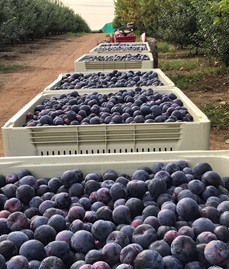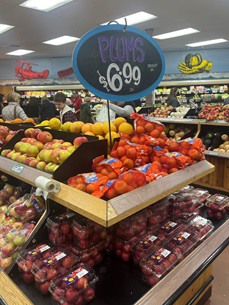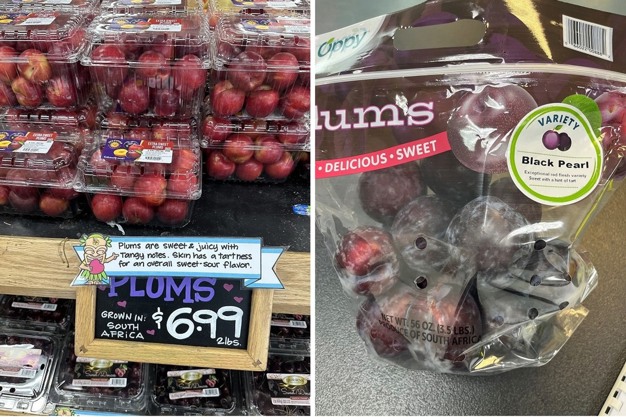 After unseasonal rain which temporarily halted the Western Cape plum harvest last week, the industry is picking as fast as possible.
After unseasonal rain which temporarily halted the Western Cape plum harvest last week, the industry is picking as fast as possible.
The plum crop is now expected to be just under 12 million export cartons (5.25kg equivalent), which is 1.5 million cartons under the start-of-season estimate and a significant drop from the 15.6 million cartons of three years ago.
"It's a lower crop due to climatic conditions and pricing is a direct function of the lower supply," says RuBisCO managing director Hubert Leclercq; the plum-focused exporter draws plums from across the broader Western Cape from week 46 to week 12. Because of the lower crop, fruit is bigger and presenting a relative shortage of smaller fruit (As and Bs).
European retailers have responded to the lower South African plum crop with prices that Leclercq calls historically high, but the situation in the UK for South African plums is, he says, totally different.
"The UK is extremely disappointing because of the price pressures there. Some – not all – of the retailers have in fact offered lower prices, citing a myriad of reasons like consumers being under pressure. They want lower prices than last year while the crop is down by one and a half million cartons from what we initially expected."
It appears that UK retailers don't seem to understand cost pressures at the grower level, he says.
"We've had to use conventional vessels at a considerably higher cost. We've had higher costs in our logistics supply but they're frankly not interested. The UK always talks about sustainability but they don't practise it. We're quite disappointed with some of the retailers."
Opportunities in the USA "Our European customers are incredibly important to us but at the same time we need alternative markets for when the crop goes back to 16 million cartons, which could be next year."
"Our European customers are incredibly important to us but at the same time we need alternative markets for when the crop goes back to 16 million cartons, which could be next year."
Right: South African plums at a Trader Joe's
Opportunity in the United States came calling when Chile had phytosanitary issues some years ago and US retail service providers had to cast their net wider.
Within three years plum exports to the US have substantially overtaken those to the Far East.
Plum shipments to Newark are, so far, 40% higher than last year, which in turn was double the previous year.
"Chile is still a major stonefruit supplier to the US market in any event, but we have very good varieties, such as Ruby Sun which opens the South African plum season in the US. This is followed by varieties such as Black Pearl, Green Red, African Delight and Ruby Star."
He maintains: "South African plums taste better than Chilean plums, and it's acknowledged by the retail trade, importers and ultimately consumers. We have new, exciting varieties, picked at a maturity that delights our customers which in turn leads to repeat sales."
Impact of Cape Town delays
Plum exports to the United States could have been even higher by now but for the delays at the port of Cape Town. In order to grow the US market for South African plums, he explains, they need reliable, regular weekly shipments.
"When retailers allocate programmes to South Africa they expect consistent supply and at the moment that has been our biggest challenge on the US trade. Our transit periods have been higher than we would want because of delays in the port of Cape Town."
Two Newark-bound container vessels loaded with plums were delayed by weeks during late January.
 "South Africa has very good plum varieties"
"South Africa has very good plum varieties"
"Last year was bad on logistics as well, but this year has been even worse," Leclercq remarks.
In Europe and the UK excessive fruit age as a direct result of shipping delays have led to some quality issues, but the relatively low volumes carry the campaign along.
"I think the plum season is going to come to a fairly rapid ending in the next few weeks. We sincerely hope that the port of Cape Town can get their act together and start delivering on the service they're mandated to supply." For more information:
For more information:
Hubert Leclercq
RuBisCO
Tel: +27 21 856 5967
Email: trader@rubisco.co.za
